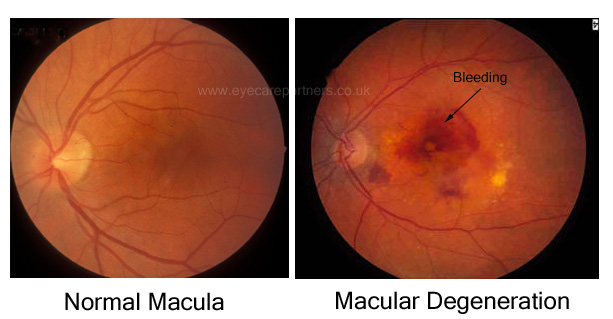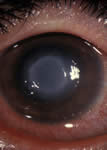| Can Taking Supplements Help Macular Degeneration?16 November 2014 | Eyecare Partners Macular Degeneration (also often referred to as AMD, short for Age Related Macular Degeneration) is a disease that affects people as they get older. It causes reduction of central vision. This can be quite mild or in some cases very severe. It is the main cause of sight loss in the UK and the rest of the Western World. There are two forms of the disease, Wet and Dry AMD. Dry is the more common type and in this form there is a slow breakdown of retinal tissue, resulting in a gradual loss of vision. Sadly there is currently no treatment available for dry macula degeneration. The Wet type comes on more suddenly and frequently results in sudden reduction and distortion of vision, due to leakage of fluid from abnormal blood vessels. There is treatment for Wet macular degeneration, which is by way of injections of drugs such as Lucentis or Eyelea. The treatment aims to stop the leaking blood vessels and hence prevent the condition from worsening. Depending on the severity of the condition, some recovery of vision can occur, although sadly in many instances, there is a permanent reduction in sharpness, due to irreversible damage to the macula cells from the leakage.
Because treatment options are so limited, the role of prevention has been looked at in some detail by a few studies. The largest of these are the Age Related Eye Disease Studies (AREDS and AREDS2), funded by the American government through the National Eye Institute. The clinical trial was in two phases. The first phase, AREDS, was completed in 2001 and second phase, AREDS 2 was completed more recently. Both looked at the role of nutritional supplements in macular degeneration. The original AREDS study established that in people with AMD, daily high doses of Vitamins C & E, betacarotene, zinc and copper, helped slow the progression of the disease to the more advanced stages. The risk of getting significantly worse was reduced by an impressive 25%. Supplements that match the formulation used in the study are usually labelled 'AREDS formulation' and include Preservision AREDS2 began in 2006 and was conducted over 5 years. Its aim was to see whether the original AREDS formula could be improved or affected by:
The results of AREDS2 showed that Omega 3 did not give any additional benefit, however adding lutein and zeaxanthin resulted in a 25% reduction in progression to advanced AMD in those whose normal diet was low in lutein and zeaxanthin. AREDS2 also found that removing betacarotene had no negative effects, which was an important finding for smokers and ex-smokers. The zinc dosage too could be reduced without affecting the efficacy of the formulation. Based on the updated research, new supplements have been launched that match the studies recommendations and they are labelled AREDS2. For those who don't like taking pills or capsules, there is now a delicious alternative, the Eye Bar, which is a chocolate bar fortified with the research formula! The AREDS Research Group also did a further follow up study on some of the participants, which showed that the beneficial effects of taking the supplements were long lasting. Those who took the supplements during the initial 5 years phase of the study were 25-30% less likely to develop advanced AMD in the 5 years following the end of the study, compared to those who took no supplements. How the supplements help exactly is not yet fully understood. It is likely to be due to a combination of the anti-oxidant effect (oxidation is a harmful but unavoidable process that occurs in all cells during cell metabolism). The retina / macula is particularly prone to high rates of oxidative stress as the retina has very active and rapid cell metabolism, due to its constant activity in converting light into signals that become images. Lutein and Zeaxanthin are found in the yellow pigments that are found in the macula. The macula pigments have a protective effect by absorbing harmful blue light (blue light is ever present in our surroundings). As we age, the level of macula pigment drops, thus leaving the macula more prone to damage from blue light. Studies have shown that increasing intake of lutein and zeaxanthin boosts the level of macula pigment, which not only has a role in preventing damage, but also can help to improve and sharpen exiting vision. Lutein and Zeaxanthin can not be manufactured by the body - they have to be obtained via our diet, either through supplements or via our diet. Foods good for macula health include:
The conclusion is that specific substances can indeed have a protective effect in at risk individuals. A good diet and or nutritional supplementation is recommended as evidenced by clinical trials. As well as this, it is important also not to smoke as smoking can increase the risk of developing macular degeneration by 3-4x.
|
| ||||||||


















